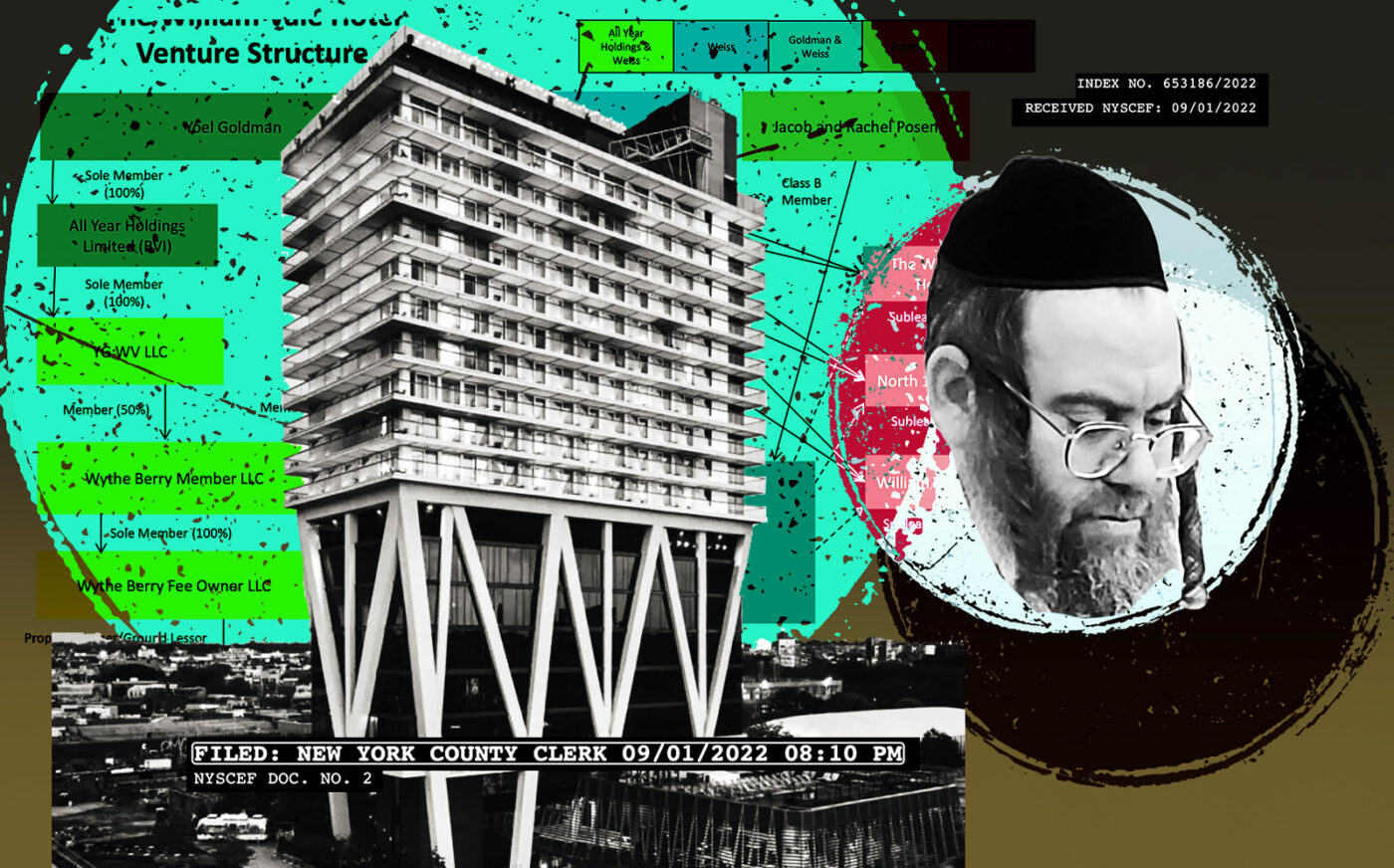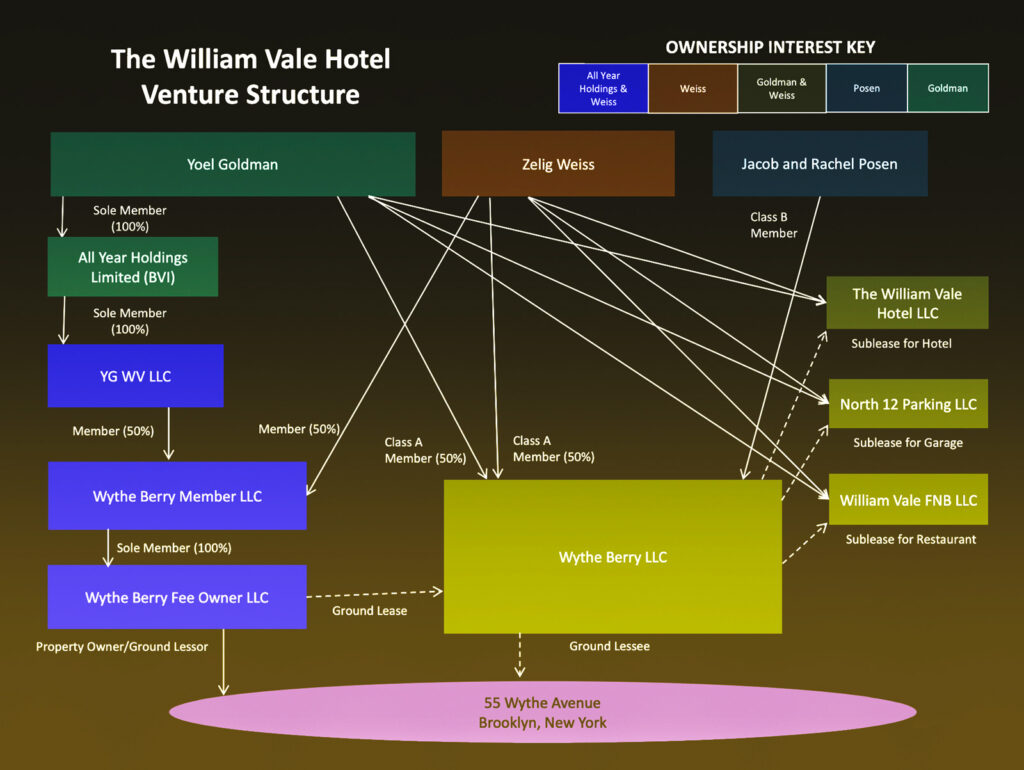
Yoel Goldman emerges to sue Zelig Weiss in William Vale dispute
Zelig Weiss suffers string of losses in state, federal court
Embattled developer’s attempts to dismiss lawsuits get poor reviews from judges

William Vale hotel in Williamsburg and Zelig Weiss (Getty; Illustration by The Real Deal)
Judges are losing patience with Zelig Weiss.
The Brooklyn developer is battling his former business partner Yoel Goldman and Goldman’s former company All Year Holdings over their partnerships, including the posh William Vale hotel in Williamsburg.
But obtaining information from Weiss and his companies has proven to be a Sisyphean task.
Now judges, one by one, are putting him on notice.
Earlier this month, a New York state court judge described Weiss’ failure to comply with an order as “willful and contumacious.”
Another state judge threw out Weiss’ argument that he was never properly served. Weiss had noted that a process server failed to identify his condo and the age and weight of Weiss’ son, who accepted the court documents.
In federal court, a bankruptcy judge who denied yet another of Weiss’ motions to dismiss said the developer has done “everything he can to throw one monkey wrench after another.”
The state and federal cases involve different issues, but they all stem from a complicated partnership dispute between Weiss and Goldman. The two were once among Brooklyn’s most prominent Hasidic developers, but in 2020 Goldman’s real estate empire started to collapse and he was removed from decision-making at All Year Holdings, which filed for bankruptcy in 2021.
Weiss, who owns 50 percent of the William Vale, has made at least two attempts to acquire All Year’s stake, but both fell through.

Goldman and Weiss’ disputes go back further than that. Goldman first sued Weiss in 2016, claiming Weiss attempted to squeeze him out of some of their Brooklyn investments by creating a separate company, transferring assets into it and leaving Goldman without a stake.
The pair reached a settlement later that year, but things quickly deteriorated. Weiss had been running the William Vale, and Goldman wanted more insight into the hotel’s finances. Goldman also claimed that Weiss never held up his end of the settlement and failed to transfer a parcel of land that Goldman claims he was owed.
In early 2019, the two signed a shtar, a contract agreeing to enter arbitration before a rabbinical court. The arbitration process dragged on for months and also collapsed.
Disputes about the William Vale continued.
“I can’t be your partner like this,” Goldman texted Weiss in August 2019, “not to be able to know what’s the balance in the accounts.“
Weiss texted back, “I don’t understand, you make me feel like a thief, you have all P&L’s you can figure it all out yourself.”
The arbitration required Weiss to give Goldman monthly copies of the hotel’s bank statements. But Weiss then sued in secular court to have the ruling nullified. He claimed that one of the arbitrators had been suspended from practicing law because of a past felony conviction. A New York state judge ruled in Weiss’s favor.
Then came the pandemic. Goldman’s issues started to pile up. Lenders initiated foreclosures on All Year’s properties and the company missed payments to its Israeli bondholders, forcing restructuring officers to take over.
Goldman sued Weiss again in 2021, alleging that Weiss never handed over a Brooklyn parcel promised in the original settlement. Weiss countered by saying that it was Goldman who never abided by the terms.
After a judge ordered the parties to go forward with discovery and depositions, Weiss’ counsel argued that it couldn’t because of a dispute with Goldman’s counsel over the production of certain documents.
At a hearing earlier this month, state court judge Reginald Boddie ridiculed Weiss’ argument.
“Defendants failed to make even a good faith effort to comply,” Boddie said, describing Weiss‘ behavior as “deliberately dilatory and willfully noncompliant with court orders.”
The judge allowed Goldman to proceed with a motion for a default judgment.
Goldman is also suing Weiss to stop him from destroying books and records and from making any major decisions at the William Vale. Goldman, who still has a stake in the hotel, is also seeking to prevent Weiss from transferring any of the joint venture’s assets.
Weiss argued that the lawsuit should be dismissed because Goldman’s lawyers never properly served him, even though the server signed an affidavit affirming that Weiss’ son, Israel, accepted the documents at Weiss’ home on Skillman Street in South Williamsburg. Weiss also argued it’s possible his son didn’t understand the process server because English is not his first or second language.
He also sought to move the case from New York County to Kings County. But the judge said Weiss’ argument had “no merit” and allowed Goldman’s suit to proceed.
Weiss’ legal battles are far from over. The developer was also seeking to stop an All Year entity that controls part of the William Vale site from receiving bankruptcy protection. The judge denied Weiss’ argument. In a hearing, the bankruptcy judge said Weiss is “like a bidder and he’s disappointed that he got turned down.”
That same All Year entity has also been suing Weiss and his affiliated companies in state court, alleging that Weiss failed to make rent payments and has been moving money from the William Vale into his other company. Weiss has denied the allegations. All Year recently sought to move the case to bankruptcy court.
Weiss did not return a request for comment, nor did his attorney. Goldman’s attorney also did not return a request for comment.
Read more

Judge slams door on Weiss’ comeback attempt for William Vale




